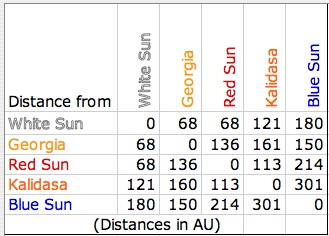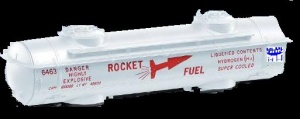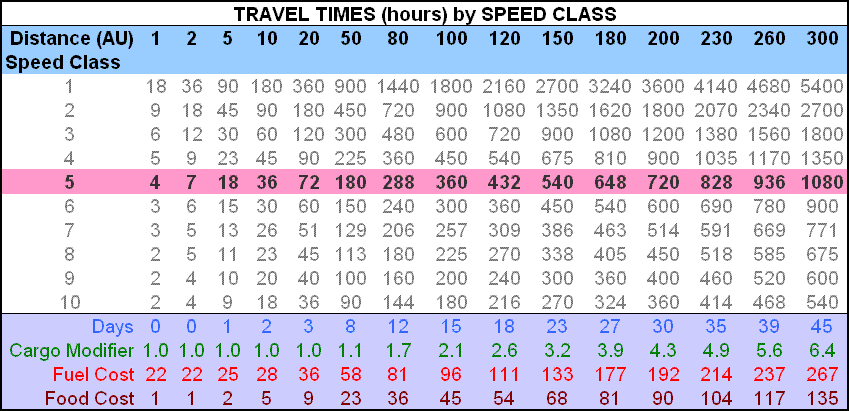Difference between revisions of "RULES"
(→Flyin in the Verse) |
(→Ship Management) |
||
| Line 57: | Line 57: | ||
This chart gives travel distances and time against speed class.<br> | This chart gives travel distances and time against speed class.<br> | ||
#Below the main chart are hours converted into days traveled.<br> | #Below the main chart are hours converted into days traveled.<br> | ||
| − | #Cargo charge multiplier (1 Credit / Ton * Modifier) for standard rates. | + | #Cargo charge multiplier (1 Credit / Ton * Modifier) for standard rates.) |
#Cost of Fuel for the journey in Credits. | #Cost of Fuel for the journey in Credits. | ||
#Cost of Food for the crew of 4 (assuming canned with some spices) | #Cost of Food for the crew of 4 (assuming canned with some spices) | ||
Revision as of 14:18, 14 January 2009
Contents
Character Generation
Character Picks a Level
- Greenhorn = 42 Attribute/Trait Points + 62 Skill Points + 12 Plot Points/Episode
- Veteran = 48 Attribute/Trait Points + 68 Skill Points + 6 Plot Points/Epsiode
- Big Damn Hero = 54 Attribute/Trait Points + 74 Skill Points & 0 Plot Points/Episode
Greenhorns lack the skills and training of more seasoned crew, but they have an uncanny luck which seems to carry them through the day.
Veterans possess skills and training, and invaluable experience that prepares them for the dangers in the Black or on the Rim.
Big Damn Heroes are ready for anything, but years chasing death have worn out most of their luck. Any luck they have, they make for themselves.
Traits
Use Cortex System rules for traits.
Combat
As per Cortex rules, except for the following: The combat sequence goes.
- All participants declare their actions before anyone resolves them. (No initiative is rolled†)
- Actions are resolved (including all dice from actions such as dodge and parry.)
- Determine effects.
Assume all actions take place simultaneously unless one action would preclude another.
†If who goes first is an issue, then make initiative rolls.
Each turn a character can declare up to three actions:
- Ranged Attack
- Melee Attack
- Dodge at +2 Step Bonus (One action applies to all attacks)
- Parry at +2 Step Bonus (One action applies to all melee attacks)
- Run 30 feet
- Other action (Draw Weapon, Aim, Grapple, Disarm, Grapple, etc.)
If you take more than one action, each action is at a step penalty equal to the total number actions.
(2 actions = -2 Step Penalty, 3 actions -3 Step Penalty)
The Serenity System does not pair skills with abilities. Instead it is up to the player to describe their actions and determine the appropriate abilities to pair with the skill. In some cases certain abilities may face Step Penalties if the circumstances require.
ex. Jayne tends to rely on his great strength to steady and aim Vera (his large gun). Normally he rolls Strength + Gun for his attacks with no penalties. This time Jayne is confronted by several Reavers approaching at high speed, to crack off three shots quickly he'd be better using his agility. If he decides to use his Strength anyway, the Gm determines his strength gets no penalty for the first shot, and a -2 step penalty for the second and -4 for the third (his great strength actually slowing him down). Had he used his agility, he'd only face the normal skill penalties.
Flyin in the Verse
Flying from one system to another (distances are as follows):

A Ship can travel 1 AU * SPEED Every 18 Hours
Summer's Gift is Speed Class 4
So it can travel 4AU/18 Hours = 1AU/4.5 Hours = 5.333AU/Day = 37.3 AU/Week
Ex. JiangYin (Red Sun) to Angel (Kalidasa)120AU (540 hours/22.5days)
Available for "Rent" or "Purchase" are standardized Fuel Pods. Each Fuel Pod takes the place of one Cargo Container and adds 100 hours of flight time.
- Fuel Pod Rental = 5 Credits / Week + Fuel
- Fuel Pod Purchase = 100 Credits.
Fuel is separate.
Suppose you wanted to make a 675 hour trip.
You could rent 2 fuel pods for 4 weeks (675 hours) for (2x4x5) 40 credits. Then fill them up with fuel 200 hours = 30 credits. So for(40 + 30) 70 credits extra you could make a long trip without stopping. While certainly not cost effective for normal journeys, it might be worth it if speed were a factor, or you wanted to avoiding stopping.
Ship Management
This chart gives travel distances and time against speed class.
- Below the main chart are hours converted into days traveled.
- Cargo charge multiplier (1 Credit / Ton * Modifier) for standard rates.)
- Cost of Fuel for the journey in Credits.
- Cost of Food for the crew of 4 (assuming canned with some spices)
Does not include Port Fees, Medical Costs, or other incidentals.
Medical Treatments & Cost
Medical Supplies are purchased in Units.
- Standard Supplies (allow for medical expertise roll at no penalties) = 2 Credits per use.
- Emergency Supplies (allow for medical expertise roll at +2 Step Bonus) = 4 Credits per use.
Each time you make a roll using medical supplies, you use one unit.
So in surgery, for example, if it takes you 10 rolls to succeed given the person's wounds, you've used 10 units of supplies.
On the Mend
- A character who engages in light activity or rest (no skill rolls) recovers 2 Life points per day.
- A character who engages in moderate activity (no heavy lifting/combat/strength based rolls) recovered 1 Life point per day.
- A character engaging in combat, strength or vitality based skills, does not recover that day. And she must make an Endurance check each hour starting at Easy, and then Average, Hard, etc.. or suffer d2 of wound damage.
Ongoing Care
Once a character is "on the mend" he or she can receive continual care from a qualified person (with Medical Expertise). Each day the character receives such care she gains an additional life point. The caregiver makes a check EASY to provide this benefit (using medical supplies if desired). For each additional patient under a care givers care, increase the difficult of all the rolls by one step. (Easy -> Average -> Hard, etc..).
Plot Points
A character gets the starting plot points every episode.
in addition to these points you can earn plot points by any of the following:
- Roleplaying
- Take one for the team. Getting hit, failing an important skill role etc.. where interesting.
- Moving the Story (pushing the plot in an interesting direction)
- Confessionals (respond to a scene with interesting commentary or back story)
- Adding story elements to the wiki
- Creating props or other tools which enhance roleplay.
Return to Mutineers Homepage

